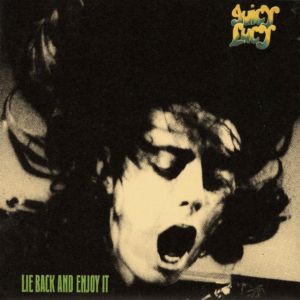
- Format: MP3

Japan 24-Bit Remaster
Saucy blues-rockers Juicy Lucy formed in 1969 from the ashes of cult-favorite garage band the Misunderstood, reuniting vocalist Ray Owen, steel guitarist Glenn "Ross" Campbell and keyboardist Chris Mercer; with the additions of guitarist Neil Hubbard, bassist Keith Ellis and drummer Pete Dobson, the group immediately notched a UK Top 20 hit with their reading of the Bo Diddley perennial "Who Do You Love," with their self-titled debut LP falling just shy of the Top 40. Ex-Zoot Money singer Paul Williams, guitarist Mick Moody and drummer Rod Coombes replaced Owen (who exited for a solo career), Hubbard and Dobson for 1970's Lie Back and Enjoy It, with bassist Jim Leverton assuming Ellis' duties for the follow-up, 1971's Get a Whiff a This.
In the beginning there was a band called The Misunderstood. Hailed in the late sixties as pioneers of the psychedelic movement by the likes of Pink Floyd, their cause had been championed by John Peel who discovered them whilst he was working as a DJ in the US. He was so impressed by them that he produced their first recordings in 1966 and invited them to come to the UK, an offer they later took up. However, having made it to the UK the Vietnam draft in the US and UK immigration services caused personnel problems, so in the late sixties Ray Owen was drafted in on vocals and The Misunderstood became Juicy Lucy.
Taking their name from a character in Leslie Thomas' "Virgin Soldiers" Juicy Lucy were aiming to move away from the psychedelic sound of The Misunderstood to something more contemporary and commercial. Well, they certainly got that right with the first single from the self titled debut album. "Who Do You Love?", a cover of a Bo Diddley song, stamped it's way up the singles charts in the UK and several European countries in the spring of 1970, finally reaching number 14 in the UK and staying on the chart for three months. The album cover itself caused quite a stir, featuring as it did a woman lying naked, surrounded (and modesty preserved) by fruit!
Unfortunately all was not well in the Lucy camp. Personal differences took their toll and Ray's position fronting the band was taken over by Paul Williams, then known for his work with Alan Price and Zoot Money. This was the first of several personel changes, including the addition of Micky Moody, later to achieve great success as a key writer and performer with Whitesnake. By the time of the band's last album "Pieces" none of the original members who had seared their way onto the scene with Who Do You Love remained in the band.
And so Juicy Lucy disappeared from sight. However, 1995 saw the return of the band. With Ray taking the position centre stage on vocals and guitar and ably assisted by Mike Jarvis (guitar) Spencer Blackledge (drums) and Andy Doughty (bass) the album "Here She Comes Again" saw the light of day. The band toured in support of the album, but could not reach out to either their old fans, or the new audience which they desired. Dispirited, that line-up called it a day after a couple of years.
Soon after the collapse of that incarnation of Juicy Lucy, Ray came into contact with Mr Fish. It was immediately obvious to each of them that the other had talent and so they decided to work together. Legal considerations at the time prevented them using the Juicy Lucy name, so they gigged and recorded as "Ray Owen's Moon", a name originally used for Ray's 1973 solo album. Over the course of the next few years there were several changes of personnel working alongside the dynamic duo; another guitarist as well as various drummers and bass players (including Fudge and the band's current manager). And then in 2002 Fletch came on to the scene. Possessing a remakable combination of skill, power and imagination he instantly fitted into place as the final piece of the puzzle and the band achieved a new level.
With a renewed enthusiasm the band set about writing, rehersing and gigging. Although still out in the cold as far as the mainstream of the music industry was concerned, they set about working at the grass roots level. Doing the unthinkable, they were playing original music in pubs and small clubs, getting a great response and building up a following. By 2004 the situation with the Juicy Lucy name had been resolved and it was clear that the band had the capability to repeat, or even exceed, it's earlier success. Sanctuary Records had released "Who Do You Love - the anthology" and interest in the band was being shown from all over the world. By mid-2004 a management deal had been struck and Juicy Lucy was back in business!